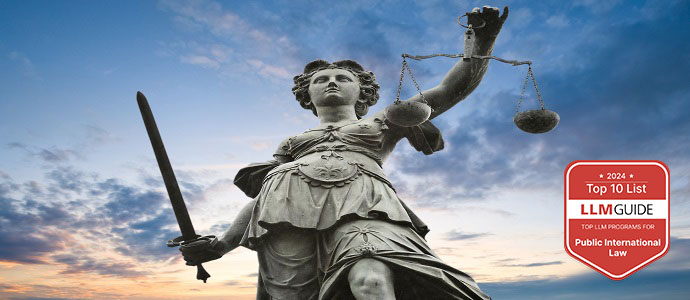Public International Law
This is a Top 10 Programme for Public International Law, worldwide.
The LLM programme in Public International Law at the University of Groningen provides students with a strong foundation in most fields of public international law, and is designed to provide an optimal mix of teaching and mentorship, to ensure the realisation of our goals in the field of knowledge dissemination and the training of academic, legal, and practical skills. The programme offers the opportunity for starting or enhancing a professional career in an international legal environment, be it at a national government level, in the United Nations, or at an international non-governmental agency.
If you would like to know more about the Public International Law LLM programme, you are welcome to join one of our Masters Week presentations for the programme. You can also watch a recording of our most recent (online) masters week presentation here.
The content information of our LLM in Public International Law is available through the left menu bar, the more practical information about the LLM programmes in Groningen can be found below.
Testimonials
You can read about the experiences of previous students below:
-
Allan Mukuki, Kenya
-
Hendrik Drößler, Germany
-
Lennart Stoffers, Austria
-
Nikee van der Gouw, Netherlands
-
Nikoloz Melkadze, Georgia
How to apply
You will find information about applying to our LLM programmes, including admissions requirements and application deadlines, here.
Tuition fees
Tuition fees
Full information about tuition fees (and payment of fees) for studying at the University of Groningen can be found here.
Studying & living in Groningen
Study information
The Dutch higher education system may differ from those in your home country. More information about aspects to know about when studying law in Groningen can be found here.
Practical information
Studying in Groningen requires that you arrange for other necessities beyond being accepted to participate in an LLM programme. Further information about moving to, and living in, Groningen can be found here.
Questions?
Prospective students
If you are interested in pursuing an LLB, pre-LLM or LLM at the Faculty of Law, you can fill out our information request form.
Applicants
If you have questions about your application, depending on what type of degree you have, you can contact:
|
Degree
|
Contact
|
|
non-Dutch degree
|
Admissions Office using this form
|
|
Dutch degree
|
Faculty of Law through LLM rug.nl
|
Current students
You can contact the Faculty's study advisers via LLM rug.nl if you have questions about your current programme or admissibility to other Faculty of Law degree programmes.
The LLM Public International Law is registered under the LLM CROHO label Public International Law (60856). The Academic Director of the LLM programme is Assoc. Prof. André de Hoogh.
Although care has been taken to ensure the accuracy of all information, there may be unintended errors and changes or deletions without notice. The matters covered by these webpages are subject to change from time to time both before and after your admission.

